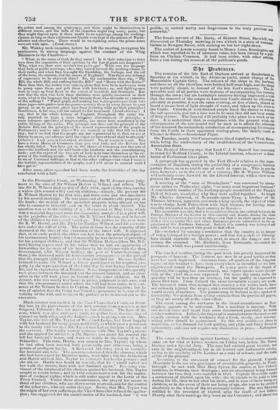In the Prerogative Court, on Wednesday, Sir 11 Jenner gave
judg ment in the case of Sir Wilmot Herten um. Wilmot and others. The late Sir R. Wilmot died on 23d of July 1e:14, aged eiehty-two, leaving a widow (his second wife) and six childrem—namely, the present Sir R. Wilmot Horton by his first wife, and three sous and two daughters by his second marriage. He was possessed of considerable property at his death ; the residue of the unsettled property being alleged on one side to amount to 100,1,001., and on the other to about 50,o01te The question was as to the validity of a n ill executed in May, 1e:14, which
-was a material departove from time aaseesition =Italie:el in a prior will,
to the prejudice of the chits: :ion, Sir 11. Vaianet Itorona and in favour of the ehildreo by the s,..rmund meavrieee. The parties in the (mew were Sir R. NV. Horton and Mr. Nichalas latrdley Wilmot. and his coexecu
tors under the will of Is:14. The point at 1`;stle Nr.IS the capacity of the deceased at the time of the execution ot' the latter will. It appeared that, at an early peried, the eldest son had been the principal object of Ins testamentary bount y but snbsequently he was desirous of providing for his younger chiltiren, and that Sir NVilliam Horton (then Mr. Wilmot) having represeeted to his father that he had an upeortunity if forwarding the itc,,rk sts of his brothers by his iativenee with the then Government, (Mr. Wianot holdieg the pest of Under-Secretary of State,) the deceased made his teste—entary arrmigetin':its on the ground that his younger children weell he thus provided Mr. He was further induced to make Mr. Wilmot a lerger participant in his acquired property by the represent at ion of the letter thet he was laying himeeif out for, and in expectation of. a Peerage. Some disagreement eulmsequently took place between the deceased and the present ()armlet. and an alteration iu time will took place in favour of tlw other children. Sir II. Jeri nor, who was nearly five houre in giving judgment in this ease, slid that the circumstances under which the will had been made, in the absence of' Sir Wilmot Horton in Ceylon, jtotified investigetion ; but lie' was of opinion that the Court was hound t., pronounce in favour of the validity of the will, and to direct the probate to he delivel eel out to the executors.
Much interest was excited in the Vice-Chaneellor's Court, (in Seamday last, by the presentation of the first petition from a ntotb:.r under Sergeant Taltourd's Act, f.n acccs to her children. The facts of the case, which Was also cut ieus ie i:sela, we anther from tl:c spyt .:hes of counsel on both sides, met tl.e judge's :Teed' in giving 5.211illlee. Mrs. Taylor, the wife of Mr. Tee :or of Weealand Lodpe, had lived happily with her husband for immeny yeare, until le:17, in iv Ii irli year a governess in the family told her thet Mr. Taylor had bed ;um intrielle with one of the servants. The tenthe were at variance with Mrs. Taylor's parents, and she applied for adviee ta a Mr. Harris ; and wider his counsel she left her husband's house-, and went to resale in the family of a Mr. Schneider. This man, I ferias, was cousin to Mrs. Taylor ; by whom he had often been aesaled both pectmiatily and otherwise, being a person ot' profligate haaits. A Reverend air. Grey tiled to reconci:e the husband and wife. The governess deciart d that the charges, which she had been urged bv Harris to make, were false ; but the Schneiders and Harris advised :Airs. late lur to maintein her hostile posture ; and she did SO. Harris was heard to remark, that he " would rather see her walk the streets, than with her husbaud again." Beemning convinced of the falsehood of the charges against her husband, Mrs. Taylor sought to return home ; and in 183$ commenced a suit for the restitution of conjugal rights, which is still under appeal to the Lords of the Privy Council. Under these circumstances, she prayed for access to three of her children, who are above seven years old, and for the control of the other two, who are under that age. Seeing that Mrs. Taylor was the origin of her own sufferings, the Vice-Chancellor refused the applica
tion; but suggested, for the consideration of the husband, that "it was e. godlike to extend mercy and forgiveness to the truly peniteut and sorrowful."


























 Previous page
Previous page